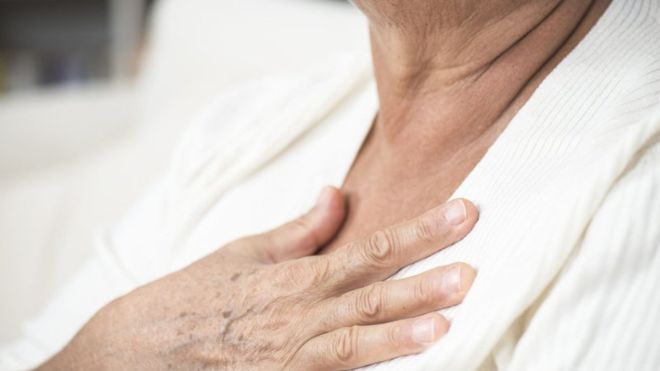
- More than one in 10 cancer patients die from heart and blood vessel problems, rather than their initial illness, a study says.
More than one in 10 cancer patients die from heart and blood vessel problems, rather than their initial illness, a study says.
The European Heart Journal looked at three million US patients, with 28 different cancers, over 40 years.
The researchers say the increase in the numbers surviving cancer means more attention should be focused on cardiovascular risk.
UK experts say doctors should be more aware and monitor patients accordingly.
Among the 3.23 million cancer patients studied, 38% died from cancer and 11% from cardiovascular diseases (CVD) – of which, three-quarters were from heart disease.
Closer monitoring
The proportion of cancer survivors dying from CVD was highest in those with disease of the bladder, larynx, prostate, womb, bowel and breast.
The risk in the first year could be explained by the effects of chemotherapy or radiation treatment on people’s bodies.
But rates continued to be higher than those in the general population. The study said cancer patients were “perpetually at elevated risk”.
Dr Nicholas Zaorsky, a radiation oncologist, from Penn State Cancer Institute, who led the study, said knowing about the risk could help patients live more healthily in the long term.
“Increasing awareness of this risk may spur cancer survivors to implement healthy lifestyle behaviours that not only decrease their risk of cardiovascular disease, but also the risk of cancer recurrence.”
Martin Ledwick, head cancer information nurse at Cancer Research UK, said: “Doctors should be aware of this research as it suggests cancer patients need to be monitored more closely after treatment, for heart disease and stroke.
“But it doesn’t tell us why some cancer patients may be at higher risk of dying from cardiovascular disease.
“For some, it might be treatment-related – radiotherapy to the chest and some chemotherapy drugs can lead to a higher risk of heart disease.
“But some of the cancers included in the study share lifestyle risk factors with cardiovascular disease – for example, obesity and smoking, which might also explain the increased risk.
“This is another reason why it’s important for everyone to have a healthy lifestyle.”
Minimising risk
Prof Metin Avkiran, associate medical director at the British Heart Foundation, said the study offered further evidence that, compared with the general population, cancer survivors are at much greater risk of death from heart and circulatory diseases.
He added: “We need more research to understand why this is, and whether factors other than the known damaging effects of some anti-cancer treatments on the heart and blood vessels are at play.
“What is becoming increasingly clear is that cancer doctors and cardiologists need to work together from an early stage to try and minimise the risk of patients surviving cancer but succumbing to heart and circulatory diseases.”



